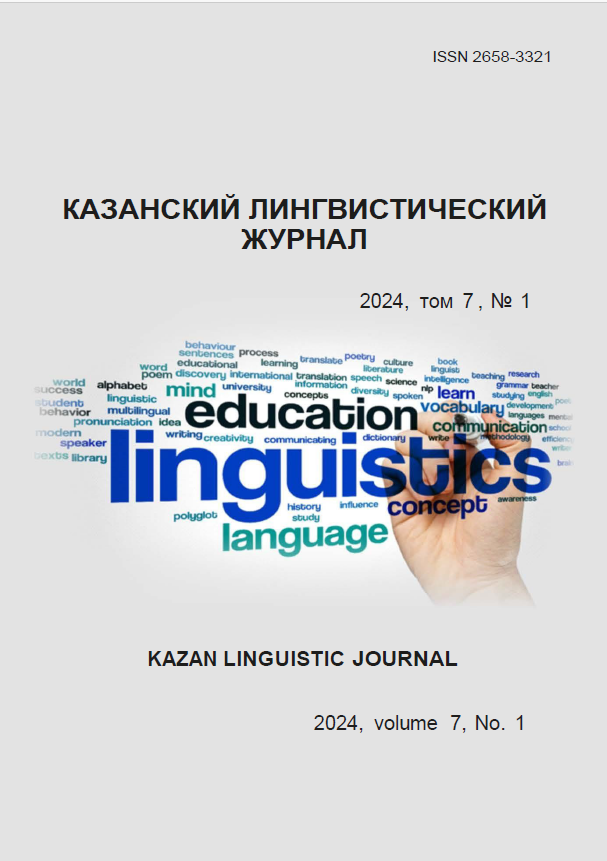Semantics of Verbs with the Meaning of Touching in Russian, Tatar and English Languages
https://doi.org/10.26907/2658-3321.2024.7.1.127-136
Keywords:
semantics, verb of touching, meaning, lexical-semantic group, Russian language, Tatar language, English language, lexical typology, secondary derivationAbstract
The given article deals with the study of lexical-semantic group of verbs with the meaning of touching in Russia, Tatar and English languages. Verbs being a part of a great number of synonymic rows have differences in lexical meanings, syntagmatic and paradygmatic relations. Verbs are often stylictically marked and have specific connotations. The authors have clarified semantic features of verbs of the given group, their integrating and differentiating units, including motivation peculiarities of these verbs. All the verbs of this semantic field are united by basic verb, in Russian it is касаться, in Tatar – кагыл- and in English – the verb touch. The aim of the study is to outline the basic models of secondary derivation, when a verb acquires additional meanings in the languages under consideration. Contact and interaction between representatives of different cultures and languages is of specific interest since touching in terms of concepts is one of the basic ways of perception and studying the surrounding world. Due to comparative approach it was possible to elicit universal tendencies of changes of verbs of touching, as well as unique ones peculiar only to one language under consideration.
References
References
Humboldt V. Selected works on language studies. Moscow: Progress; 2000. (In Russ.)
Kreydlin G.Е. Non-verbal semiotics: body language and natural language. Moscow: Novoye literaturnoye obozreniye; 2004. (In Russ.)
Gaysina R.М. Lexical-semantic field of relations verbs in modern Russian language. Saratov: Izdatelstvo Saratovskogo universiteta; 1981. (In Russ.)
Gyro-Veber М., Mikaelyan I. Semantics of touching verbs in French and Russian languages: toucher, касаться, трогать. Dubna: Logical analysis of the language. Languages of dynamic world. 1999:18–35. (In Russ.)
Explanatory dictionary of Russian verbs. Ideographic description. English equivalents. Synonyms. Antonyms. edited by Babenko L.G. Мoscow: АSG-PRESS;1999. (In Russ.)
Russian national corpus. 2003–2023. Available from: https://www.ruscorpora.ru [accessed 18.09.2023].
Written corpus of the modern Tatar language. Available from: https://www.corpus.tatar/ [accessed 18.09.2023].
Kalinina А.G., Sakaeva L.G., Tahtarova S.S. Semantic field “Alimento” as a reflection of the Spanish national culture. Kazan linguistic journal. 2023;6(1):80–89. (In Russ.) https://doi.org/10.26907/2658-3321.2023.6.1.80-89.






